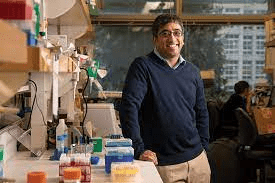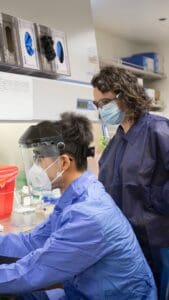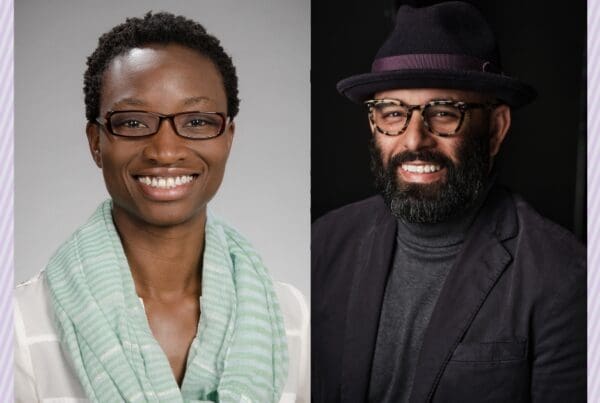Highlights | Progress in precision medicine
- The Brotman Baty Institute for Precision Medicine was founded in November 2017 by UW Medicine, the Fred Hutchinson Cancer Research Center and Seattle Children’s.
- Its mission is to accelerate both the basic sciences of precision medicine and the delivery of its benefits to patients.
- BBI leverages its resources to promote promising ideas and technologies, empower cross-institutional collaborations and generate foundational datasets and tools for precision medicine.
When it comes to precision medicine, Seattle is a hub for groundbreaking research. It’s also home to several of the world’s leading hospitals and healthcare systems.
Enter the Brotman Baty Institute (BBI). Established in November 2017 by UW Medicine, Fred Hutchinson Cancer Research Center and Seattle Children’s, BBI was created to take advantage of Seattle’s unique ecosystem to further biomedical research and patient outcomes through the development and application of precision approaches to healthcare.
BBI’s investigators work together on shared scientific interests to advance areas like medical genetics, cancer biology, infectious disease and technology development. Its collaborative organizational structure helps enable BBI to set new standards and build core resources for the field of precision medicine.
Four years after the initial $50 million founding gift from Jeff and Susan Brotman and Dan and Pam Baty, BBI today is advancing the field of precision medicine and providing investigators with the tools they need to do so.
Grant programs rooted in collaboration
BBI’s grant program is a prime example of the institute’s collaboration. Grants are awarded each year in two categories: Catalytic Collaborations, which invest in innovative, collaborative projects that address basic science or translational research questions; and Precision Medicine Clinical Labs, which provide support for developing and implementing new technologies in BBI-affiliated clinical diagnostic labs, and to foster trainee education.
The top requirement for a Catalytic Collaborations grant is cross-institutional teamwork. Each team must have at least two BBI member investigators from two of the co-founding institutions. To date, BBI has awarded $5.6 million to 54 projects that have led to discoveries in pancreatic cancer, treatment of multiple myeloma, preventing cancer through the use of electronic health records, and promising genetic diagnoses of rare diseases (to name a few), as well as numerous papers published in peer-reviewed journals.
“Collaborative research is an integral element of BBI’s work, as well as the essence of precision medicine,” says BBI’s scientific director Jay Shendure, MD, PhD.

BBI Scientific Director Jay Shendure. Photo courtesy of Seattle Business magazine.
Seattle’s community-based Flu Study
One of BBI’s most well-known programs, the Seattle Flu Study, is truly a community-based program. With investigators across the founding institutions and participants within the UW and Seattle area, the study is driven by community efforts to understand disease outbreak, evaluate interventions and inform the public health response. This study was also one of the first to discover and identify community spread of COVID-19 in the Seattle area.
“We originally created a city-wide platform for the surveillance of respiratory pathogens in an effort to study ways to help mitigate emerging pandemics,” says Lea Starita, PhD, Seattle Flu Study researcher and co-director of the Brotman Baty Advanced Technology Lab. “This was one year before the onset of a bona fide pandemic.”
Also, the BBI Pathogen Detection lab supports all testing for Husky Coronavirus Testing, the COVID-19 testing program for the University of Washington.

Lea Starita, right, co-director of the Brotman Baty Advanced Technology Lab.
Making advanced technology more accessible
Technology is a major contributor to the advancement of research. BBI develops and facilitates access to cutting-edge technologies for member investigators through its platform services. With six platforms and more on the way, access to technology isn’t a barrier, it’s an asset.
One of the newest platforms BBI is launching focuses on long-read sequencing, which is a clinical diagnostics platform based on “third generation” DNA sequencing: a more precise way of getting a genetic diagnosis. What this could mean for patients and providers is being able to better identify risk of rare disorders through DNA, which can have a profound effect on how clinicians manage their patients’ care.
The long-read sequencing platform was started from data produced by a Catalytic Collaboration grant on genetic diagnoses of rare disease. The study produced by the collaboration, published in the American Journal of Human Genetics, found that the “eventual implementation of long-read sequencing (LRS) will have a major impact on all aspects of clinical genetic testing, because as a single test LRS has the potential to replace nearly every other genetic test currently offered.”
Access to data analysis tools
Another platform taking off in a rapidly emerging field is the Single Cell Bioinformatics Platform, which includes single cell data and sequencing at UW Medicine, single cell bioinformatics at Children’s and data visualization at Fred Hutch.
Single cell analysis helps researchers gain insights into cellular components and function. The human body has 37 trillion cells, and detailed maps of the body’s cellular makeup can help researchers see how disease is expressed at a single cell level.
“The intersection of these single cell resources with human genetics is the next frontier in precision medicine,” says Shendure. “And the data tools available to BBI members play an important role in moving this research forward.”
The platform provides open-source pipelines and weekly office hours to help troubleshoot issues, as well as quarterly data analysis tutorials to help collaborators in the single cell community navigate all levels of analyses of single cell data.
The data visualization portion of this platform, based at Fred Hutch, takes the data accumulated and analyzed by the single cell labs and produces visual atlases to help researchers understand and interpret this data. See examples on the Descartes platform.
Working groups address clinical and scientific challenges
Working groups at BBI are a combination of all that BBI offers — collaborating investigators, grants and technology tools — and grouped together, they can address specific challenges facing researchers. Two areas BBI is pursuing are the use of cell-free DNA for the detection of cancer and other diseases, along with whole genome sequencing testing for children and infants with developmental delays.
Noninvasive, early detection of cancer
The cell-free DNA working group is laying the groundwork for new approaches in noninvasive diagnostics and health monitoring. Cell-free DNA (free-floating fragments of DNA that can be found in blood, cerebral spinal fluid, urine and other bodily fluids) is promising for the noninvasive, early detection and treatment of cancer, prenatal screening and the detection of transplant rejection. The group is leading the collection and analysis of pilot cell-free DNA data across a broad range of clinical conditions.
“The goal is to refine how cell-free DNA is collected, processed and analyzed, as well as to explore how it can be used to help address a variety of diseases,” says Christina Lockwood, PhD, DABCC, DABMGG, the group’s chair and a UW Medicine associate professor in the Department of Laboratory Medicine and Pathology.
Precise care for rare pediatric disease
The pediatric sequencing working group is composed of three pediatric sequencing projects whose investigators are completely rethinking how certain types of childhood and newborn disorders are diagnosed and treated.
SeqFirst, which launched in January 2021, is one of the research studies in the working group. Rather than forcing patients and their parents to go from specialist to specialist and racking up costly bills with no answers, the study’s principal investigators are conducting full genome sequencing that can more quickly and efficiently identify potential causes of developmental delays and create more tailored and precise treatment plans. The study is also attempting to identify how the sequencing first workflows can be leveraged to provide more equitable access to precision genetics in under-resourced communities.
The pediatric sequencing working group is also applying a sequencing approach to pediatric cancers and epilepsy projects.
“We anticipate these efforts will lead to earlier, more rapid diagnoses, as well as lowering healthcare costs and improving subsequent treatment for these children,” says Michael Bamshad, MD, the project’s principal investigator. “This is an ambitious endeavor to build equity for all children who might benefit from whole genome sequencing.”
Looking toward the future
The BBI was created with a mandate to accelerate both the basic sciences of precision medicine and the delivery of benefits to patients. Over the next five-plus years, it is anticipated the Institute will focus on six scientific areas: human genetics, human development, precision oncology, precision therapeutics, computational health, and infectious disease.
“The past four years have reinforced our belief in the transformational potential of basic and translational research in precision medicine,” says Shendure. “BBI has been on a rapid trajectory, both scientifically and organizationally, and we are delivering on the vision of catalyzing Seattle-based collaboration in precision medicine and precision health. Our six areas of focus will enable us to continue this momentum as well as to expand upon that vision.”
Get involved
- Apply for grant funding.
- Become a donor.
- Are you interested in becoming a BBI member? Learn if you qualify.
- For more information, email info@brotmanbaty.org.
Photo caption: BBI research scientists Saskia Ilcisin (foreground) and Diana O’Day examine cells in a BBI lab.


